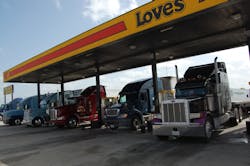Fuel prices keep falling due to weak oil outlook
Average retail pump prices for diesel and gasoline in the U.S. declined this week mainly because of falling global oil prices, according to data tracked by the Energy Information Administration (EIA) – a trend the agency expects will continue due to a slower global economic growth.
After increasing over 5 cents per gallon last week, average diesel prices in the U.S. fell 1.6 cents to $3.661 per gallon this week, EIA noted – which is 16.1 cents per gallon cheaper compared to the same week in 2013.
Regionally, diesel prices only ticked up on the West Coast by 8/10ths of a penny to $3.72 per gallon, though that became a 2 cent drop to $3.767 per gallon with California’s prices removed from the mix.
EIA added that the largest one-week diesel price declines occurred in California – down 4.4 cents to $3.797 per gallon, which is also the highest price for diesel in the U.S. this week – followed by the Rocky Mountains (down 2.9 cents to $3.767) and the Lower Atlantic region (down 2.8 cents to $3.469, the cheapest diesel in the country this week).
The national average for gasoline continued falling this week, dropping 4.7 cents to $2.894 per gallon – some 32.5 cents per gallon cheaper compared to the same week in 2013.
Regionally, the largest one-week declines in gasoline prices occurred in the Rocky Mountains (down 6.5 cents to $3.011 per gallon), the West Coast (down 5.4 cents to $3.114, which changes to a 3.4 cent drop to $3.050 with California removed), plus the Midwest and Gulf Coast, which both registered a 5 cent drop to $2.836 and $2.673 (the cheapest price for gasoline in the U.S.), respectively.
According to EIA’s analysis in its most recent Short-Term Energy Outlook (STEO), Brent crude prices will average $83 per barrel in 2015, which is $18 per barrel lower than last month’s outlook.
The agency also expects oil prices to remain in the $80 to $90 per barrel range next year, bottoming out under $82 per barrel in the second quarter before increasing during the second half of 2015 to average $86 per barrel by the fourth quarter of next year.
EIA added that its lowered oil price forecast reflects significant changes to what it calls the “global oil balance,” meaning that global liquid fuels demand is projected to decline by 200,000 barrels per day (bbl/d) to average 92.5 million bbl/d, reflecting a weaker global macroeconomic outlook.
“The combination of robust U.S. [oil] production growth, a return of disrupted Libyan production, weakening expectations for the global economy – particularly in China – and seasonally low refinery demand are weighing on oil prices,” EIA noted.
“More recently, indications from Saudi Arabia that it will not operate as the unilateral global swing supplier are putting further downward pressure on traders’ views of the market,” the agency added. “Signs of willingness by other OPEC [Organization of Petroleum Exporting Countries] members to trim production [remain] scarce. Together, these conditions point to a much looser global supply/demand balance in 2015.”
About the Author
Sean Kilcarr
Editor in Chief
Sean Kilcarr is a former longtime FleetOwner senior editor who wrote for the publication from 2000 to 2018. He served as editor-in-chief from 2017 to 2018.
